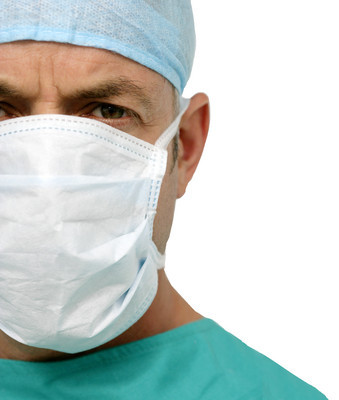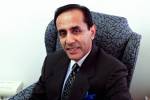Who is that Masked Man?
It's come to this: Medical experts recommend that consumers ask their doctors whether syringes, needles and medication vials are being reused.
It's good to be an informed consumer. But how odd is it that patients should ask highly educated doctors about a basic medical protocol that, by now, is known to pretty much every kid in junior high health class?
These are strange times for Southern Nevada's health care consumers. But, in the wake of closures of several local endoscopy clinics that were not taking such elementary precautions -- and the more than 40,000 people who must be tested for HIV and hepatitis because of it -- it's a good time to face facts: Choosing a health care provider ultimately is an act of faith, and there's no way to guarantee that a doctor, nurse or other medical professional never will cut a corner or act unethically.
Grim as it sounds, informed consumers who play an active role in their health care stand the best chance of having a good experience. Here are some tips:
FINDING A DOCTOR
Like finding a trustworthy mechanic or handyman, a good place to start in finding a trustworthy doctor is by asking for recommendations from trusted friends, family and co-workers.
"If you talk to five people you trust who say, 'This is a great doctor,' that's a good recommendation," says Dr. Thomas Hunt, an associate professor in the University of Nevada School of Medicine's family and community medicine department. "If everybody you talk to says, 'Well, it didn't really work out for me,' that's telling also."
"If you do happen to know other health professionals in the community, they could make recommendations as well," notes Dr. Lawrence Sands, chief health officer for the Southern Nevada Health District.
Marin Gillis, director of medical humanities and ethics at the University of Nevada School of Medicine, also considers pharmacists a vastly "underused resource" for finding potential doctors.
Once a potential physician is chosen, an Internet search can serve as a basic, albeit limited, first step. Entering a doctor's name on Google (www.google.com) or another search engine can show, for example, news story mentions, links to the doctor's resume and professional memberships.
Similarly, entering a doctor's name in the "parties" search engine of a local court system can link to court cases -- of all sorts -- in which a doctor was involved.
The Clark County Medical Society's Web page (www.clarkcountymedical.org) can offer basic information about member physicians, too. Just follow the "members" link on the home page.
Dr. Weldon "Don" Havins, the society's president, said the organization also offers consumers information about member physicians' specialties and board certifications, and languages spoken in their offices.
Havins suggests, also, that consumers call the Nevada Board of Medical Examiners for information about disciplinary actions that may have been taken against physicians.
Through links on the board's Web site (www.medboard.nv.gov/) a doctor's license status can be verified, while information about a licensed doctor's education, training and malpractice history can be obtained by calling the board (toll free at 888-890-8210 or 775-688-2559, then pressing zero for the board's credentialing specialist).
Information about osteopathic physicians can be found via the Nevada State Board of Osteopathic Medicine's Web site (www.osteo.state.nv.us). Click on the "enforcement" tab, drop down to "licensee list" and physicians can be searched by city or ZIP code. Then, follow the link for information about osteopathic physicians, including training and whether the doctor has been the focus of malpractice or disciplinary issues.
There also are Internet services that, for a fee, will provide similar information. "I've heard of them," Havins says, "but I have no idea how accurate they are."
Hunt recommends searching for a doctor who's board-certified in his or her specialty. Board certification, which is voluntary, means that a physician has undergone a rigorous testing and peer evaluation process to become, and remain, exceptionally skilled in a particular specialty.
The American Board of Medical Specialties Web site (www.abms.org) offers general information about board certification and links to the group's 24 member boards, from allergy to urology.
THE INITIAL VISIT
Hunt suggests using your first visit to a doctor as "an opportunity to evaluate the practice and be sure you feel comfortable with it."
Things to look for, Hunt says: Does the doctor have good communication skills? Does the doctor answer questions and explain issues in an understandable way? Do you understand the treatment plan when you leave?
Ask a doctor about his or her training. And, if your primary care physician is referring you to a specialist, ask why he or she recommends that particular doctor.
Take note of a doctor's office practices. Sands recalls a chief of staff during his own med school days who "told us that, whenever we walk into a room, before touching the patient, wash your hands so the patient can see your hands are clean."
"That is something that's very important, yet seems very trivial to a practitioner," Sands adds. "But it really is one way to communicate to patients that procedures are being taken to ensure their safety and comfort."
Note, too, whether the doctor's staff is similarly committed to proper practices. "I might be the best doctor in the world, but if my staff treats you like dirt, it's not going to work out very well," Hunt says. "And, a lot of times, physicians don't know exactly what goes on with their staff."
If something seems amiss, "ask about it," Sands says. Health professionals "have to be receptive to those questions and not look at those as challenges to their authority but see it for what it is: patients expressing a concern that needs to be addressed so they can feel secure and safe."
If doubts are raised through these questions or observations, the patient may want to consider another doctor.
IF A PROCEDURE IS CALLED FOR
If a procedure is recommended -- colonoscopies were involved in the current controversy -- ask even more questions.
Sonya Hill, health facilities surveyor for the Nevada State Health Division's Bureau of Licensure and Certification, says researching a procedure beforehand enables a patient to learn what it's for, how it's done and come up with more specific questions for a doctor.
On the Web, WebMD (www.webmd.com) is a solid source of general medical information, as is the U.S. Department of Health and Human Services' Healthfinder (www.healthfinder.gov), a guide to reliable health-related links.
Wanda Wilson, president of the American Association of Nurse Anesthetists, recommends asking a physician, "How many of these cases have you done, and have you had good outcomes?"
Surgeons and other professionals "should be very open with that," she adds. "They should not be offended."
Ask, too, about other professionals who will be working on the team. For example, anesthesia or sedation can be provided by an anesthesiologist (a medical doctor who has received additional training and board certification in the speciality of anesthesiology) or a certified registered nurse anesthetist (a registered nurse who has spent 24 to 36 months training in an accredited education program and passed a national certification exam). So ask about those professionals' qualifications, too.
In the wake of Southern Nevada's incidents, the American Society of Anesthesiologists recommends that patients ask:
* Who will be administering anesthetic medication and (if the provider isn't an anesthesiologist) do I have an option to request an anesthesiologist?
* What type of anesthesia care will I be given?
* Do you throw out needles, syringes and vials after every patient use?
For more information, visit the patient information links from the American Society of Anesthesiologists (www.asahq.org) and the American Association of Nurse Anesthetists (www.aana.com) Web sites.
FACILITIES
Today, many procedures take place not in hospitals, but in ambulatory surgery centers. About 30 of Nevada's 50 state-licensed ASCs are in Southern Nevada, according to the Nevada State Health Division.
The centers are inspected by the state before they can accept patients, and also are inspected when a complaint is received.
"Ask when was the last time the facility or center was inspected," Hill says, and how the center fared.
"You may want to ask questions (about) who's responsible for day-to-day operations within the center. What kind of infection control policies do they have in place? Is somebody responsible day to day for making sure those polices and procedures (are followed) and everything's handled correctly?"
The state health division also recommends asking: How diagnostic equipment at the center is sterilized after each use; whether single or multiple-dose medication vials are used, and if label instructions for both are followed to the letter; and whether the facility has ever received a complaint of the spread of an infectious disease resulting from staff practices.
Patients can request a copy of the facility's infection control policies. And, patients can request a copy of the most recent federal survey or compaint survey, if any, conducted at the facility by writing to: The Nevada State Health Division, Bureau of Licensure and Certification, 4220 S. Maryland Parkway, Building D, Suite 810, Las Vegas, NV 89119.
Information about ambulatory surgery centers can be obtained from the health division's Web site (www.health.nv.gov) by following the "health facilities locator" link. For other information about ASC inspections, call the division at 486-6515.
Note, however, that physicians who perform procedures in their own offices don't require ASC licensure or inspections for those offices.
FINALLY ...
Trust your gut. If something seems amiss, if a doctor is offended by your questions or if the dust bunnies under the treatment table bother you, find another doctor.
A doctor-patient relationship is based on mutual trust, Gillis says. "You have to feel comfortable in that relationship like you do in any relationship. It can't be just one-way."
But there are no guarantees.
"At the end of the day, nobody's wearing any buttons that say, 'Hey, beware of me,' " Hunt says.
But "as outrageous and as scary as this is to people," he adds, it's also a reality that the overwhelming majority of physicians here and across the country are "good, honest doctors."
Nor should the clinic shutdowns here be reason for consumers to not obtain needed procedures or treatments. In fact, if Southern Nevadans do need, say, colonoscopies, Havins offers, "I think this is the very best time to have it done."
Right now, he says, clinics and doctors are "double-checking, triple-checking to make sure everything is being done according to standards and according to accepted aseptic techniques."
Contact reporter John Przybys at jprzybys@reviewjournal.com or (702) 383-0280.
USEFUL WEB SITES • American Association of Nurse Anesthetists • American Board of Medical Specialties • American Society of Anesthesiologists • Clark County Medical Society • Nevada Board of Medical Examiners • Nevada State Board of Osteopathic Medicine • Nevada State Health Division • U.S. Department of Health and Human Services • WebMD




























